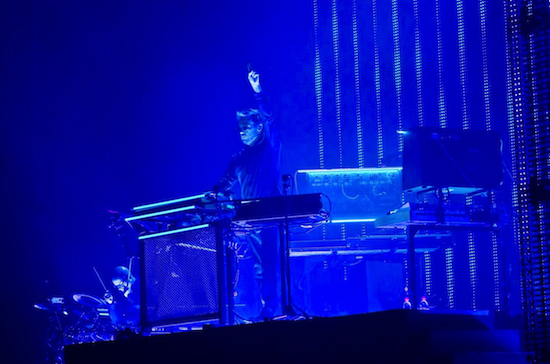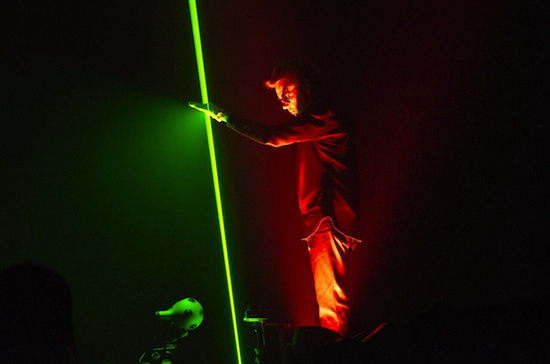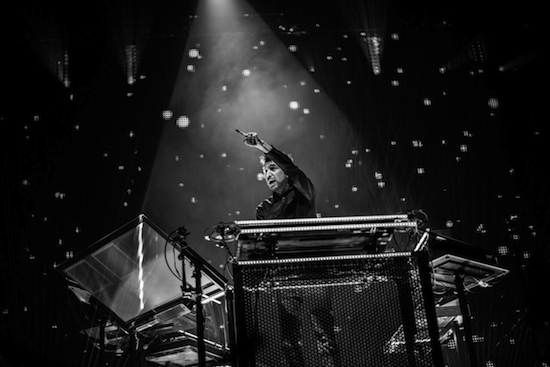All Jean-Michel Jarre live photographs by Louis Hallonet
30 years ago, a Jean-Michel Jarre gig would have been all about extravaganza on a Brobdingnagian scale, an unashamedly Debordian hymn to distraction, with compliant spectators exceeding the visual peripheries and spilling over the horizon. It would probably be in the outdoors, at the invitation of the municipalities of the world’s finest squares, panoramically vast and accommodating millions of sets of eyes with dazzling lasers soundtracked by sheer sonic bombast. These spectacles were the bread and circuses and the loaves and the fishes all rolled into one, during a decade where more always meant more.
For a lone Frenchmen who doesn’t sing, Jean-Michel Jarre has sold an extraordinary amount of records. 80 million is the estimate, which is probably about 10 million more than an era-defining group like Duran Duran. Oxygène on its own has sold somewhere in the region of 15 million to date. Although still popular of course, it’s difficult to reimagine the kind of adoration that was reserved for him in the 20th century, where he broke his own world record for highest attendances three times. Three of those gigs (and the word "gigs" feels somehow inadequate) were in Paris, with the fourth in Moscow in 1997, where three and a half million people showed up. In an age of high security and hypersensitivity about terrorism, it’s hard to imagine that record not standing beyond our lifespans.
Even the UK wasn’t immune, with JMJ starring two nights at London’s Docklands in 1988 with an outlandish firework display and Hank Marvin in toe; 100,000 came for each display. Now the Bercy is big (or the AccorHotels Arena if you’re the sponsor), but it’s not two and a half million people at La Défense big, or even 200,000 at Docklands over two nights big. These days one can naturally expect visual ostentation from Jarre – it is after all his USP – but it’s not about the numbers any more, in the same way that it would be preposterous to expect 20 million people to stay up past their bedtimes on a Sunday night to watch the final of the snooker. Times have changed, but Jean-Michel Jarre’s reputation as the daddy of spectacle, and the dandy of electronica, still remains.
Tonight, despite the fact JMJ has recently recorded and released around 30 collaborations over two albums – Electronica 1: The Time Machine and Electronica 2: The Heart of Noise – there are no cameos from Gary Numan, Vince Clarke, Little Boots, M83 or Sebastien Tellier (or Hank Marvin for that matter). The closest we get to an appearance is on the excellent ‘Brick England’, recorded with the Pet Shop Boys, though for the purposes of the live show, Neil Tennant’s vocals are replaced with – or channeled through – a vocoder, and the two neon figures projected onto the front of the stage no more resemble Tennant and Lowe than they might Clive Dunn and Arthur Lowe. The show is all about Jean-Michel Jarre this evening, and that’s understandable given how prolific he’s been of late. As well as putting out the two aforementioned albums, he’s also just released the third part in the Oxygène trilogy, which now stands at 20 movements and brings the saga to a head some 40 years after the adventure began. So there’s plenty to be pushing on with.

The first thing that strikes me in Paris is how loud everything is. We’re talking Motörhead jamming with The Who loud, which makes us wonder if we should have taken the complimentary earplugs that were being offered out alongside glossy programmes ahead of the show. The second thing – and this is the bigger surprise given Jarre’s chequered history of flamboyance – is how aesthetically tasteful it all is. 3D cubes of green light hover on stage and then break apart like TIE-fighters to reveal a nerd’s Gallifreyan wet dream of a set. Jarre is beset by waves of gossamer red light with control panels and instruments all around him, and he’s flanked by two Glitter rock drummers who also moonlight as musical auxiliaries throughout. As the show progresses, the swathes of lighting of various exotic hues drape themselves over the stage, with projected images interacting with each other like some living Vorticist installation. At times it’s mesmerising, and not just because it’s clearly frighteningly expensive.
The third surprise is just how banging some of what’s on offer tonight is, even if many of the collaborations on his recent Electronica albums were techno heavy, with the likes of Fuck Buttons, Jeff Mills and Gesaffelstein leading the charge in union with their progenitor (tracks recorded with all three get the live treatment this evening). On ‘Conquistador’, recorded with the latter, JMJ even throws on a guitar and chugs out some power chords before riding a magic carpet of feedback at the conclusion. What some of his fans from the glory years must think of the new stuff one can only speculate upon, though if they started losing touch around the time of Les Chants Magnétiques and were here for purely nostalgic reasons, then it would be fair to forecast plenty of rude awakenings.
The finest moment of all – and perhaps one of the finest moments of 2016 – is ‘Exit’, Jarre’s collaboration with Edward Snowden, recorded in the dead of winter in Russia last year, and landing with great fanfare internationally this summer. It’s an invigorating and ear-decimating track that hurtles pell mell before slowing down to allow the ex-NSA agent to deliver some home truths about surveillance.
"Saying that you don’t care about the right to privacy because you have nothing to hide is no different than saying you don’t care about freedom of speech because you have nothing to say," sermonises Snowdon, his gigantic face projected in triptych atop the mise-en-scene. "What may not have value to you today, may have value to an entire population, entire people, an entire way of life tomorrow. And if you don’t stand up for it then who will?"
Again the music gallops at staggering velocity, leaving the crowd breathless as it judders to its final halt. For anyone who assumed Jarre’s relevancy had dissipated with time, ‘Exit’ is a violent riposte to that assumption, saying more about a year in which the British government passes the Investigatory Powers Act with barely a whimper than nearly any other track released in 2016. What’s more, the song itself is a damn fine slab of thunderous techno, uncompromising, angry and innovative.
Many sat below us in the main arena are delighted when ‘Oxygène part 4’ finally cranks up so they can at last unleash their camera phones and shoot a visual memento to take away with them. As one of the indisputable godfathers of modern electronic music as we know it, it would be easy for Jean-Mi to rest on his laurels, but tonight’s set is heavily weighted towards the present rather than past glories. Aside from revisiting his crowning triumph and adding further movements to maybe entice back some of his audience antérieure, his instincts seem to be geared towards the future at all times. Perhaps it’s this that has helped him sustain a career for over four decades, or perhaps not being one of the lauded Teutonic overlords of techno is what inspires him on. Where electronic music is concerned, he’s hardly a footnote, but it could also be argued he rarely gets quite the credit he deserves.

The Electronica albums go some way to redressing the balance. Artists from three generations were clamouring to work with him. The reason there was so much material in the end, spread over two albums, was the fact everyone he claims he approached came back and said, "Yes". Aside from the glut of artists we’ve already mentioned, Pete Townshend, Laurie Anderson, John Carpenter, Hans Zimmer and Edgar Froese were just a few more of the names that got on board. The collaboration with the latter Tangerine Dream man turned out to be one of Froese’s last, which perhaps should have been billed as a meeting of two of the last great authentic voices of electronic music coming together at last. As it was, it received little of the fanfare that, say, the Edward Snowden track generated. The great German acts that originated in the 70s and trip off the tongue – Kraftwerk and Neu and Faust and Can – and even Giorgio Moroder – are too often given props where Jean-Michel Jarre misses out. Kraftwerk of course are the great innovators, and it’s fashionable these days to argue that they were more influential than the Beatles. Whatever the truth, it’s fair to say their recent shows have been driven almost entirely by nostalgia, and they’ve become – quite literally in the case of their residency at the Tate Modern – a museum piece. The songs remain the same, while the 3D glasses that don’t entirely work properly no doubt remind Debord fans of The Society of the Spectacle cover art.
Jarre, who flits in and out of respectability as fashions change, is still driving forwards and attempting to look at what he does differently each time, dismantling it and reassembling it, and in the case of the Snowden track, subverting from within. His greatness then needs to be restated, for Jean-Michel Jarre deserves to sit at the top table with Kraftwerk and Tangerine Dream. Perhaps he doesn’t get enough plaudits because he’s French? No, the truth is simpler than that: it’s not because he’s French but more because he’s flash.


